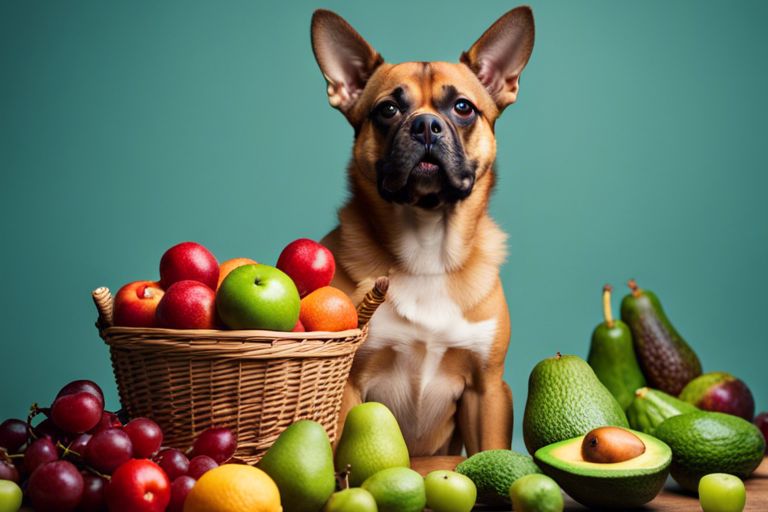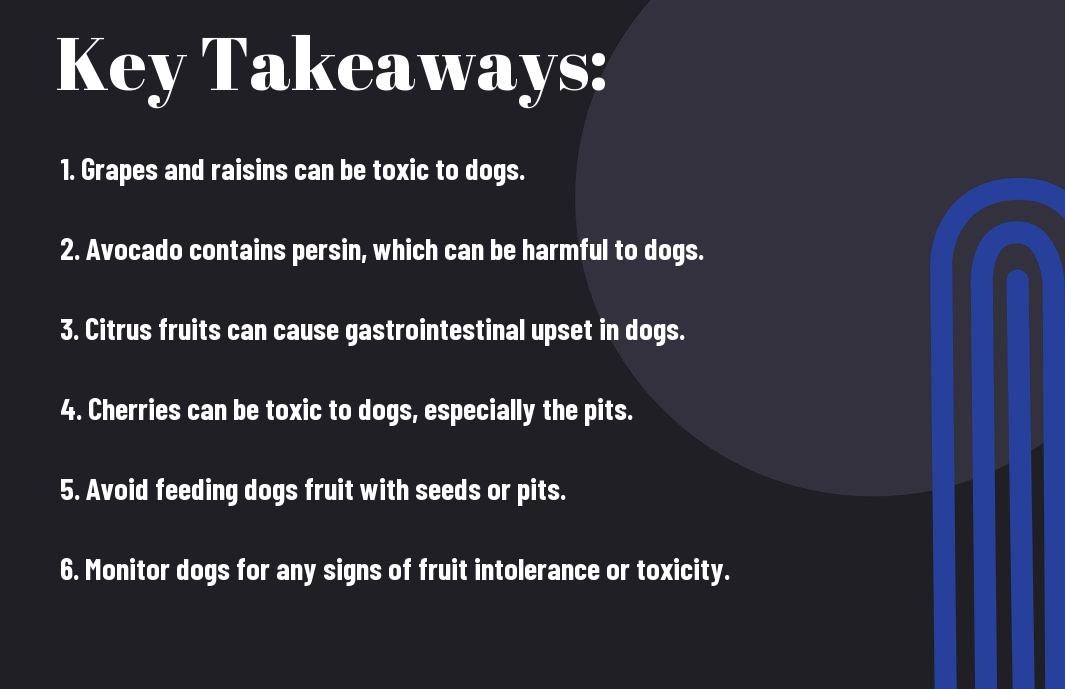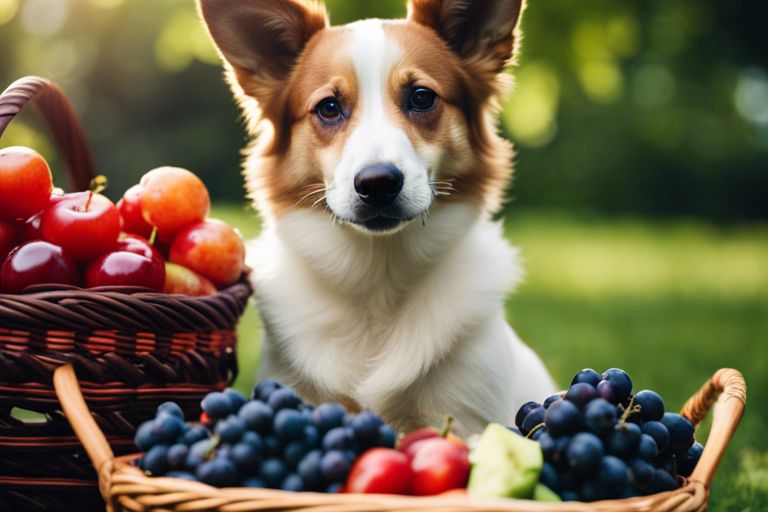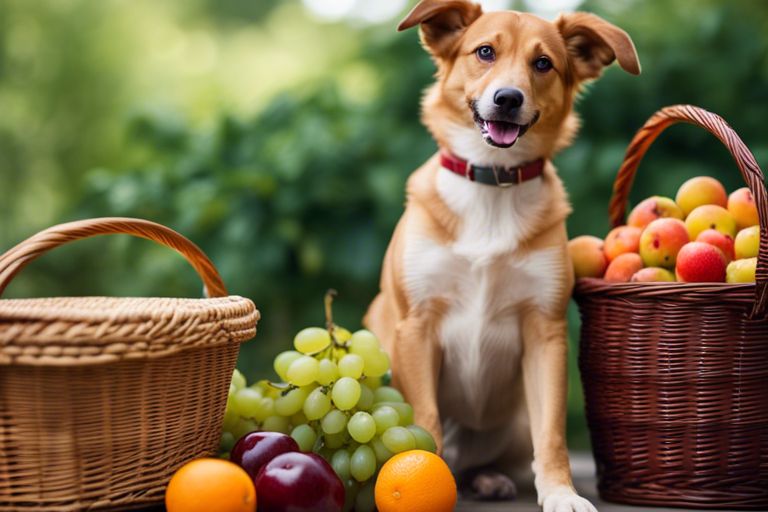Citrus fruits may seem cute, but for your furry friend, they could cause quite a dispute. From grapes to cherries, some fruits can lead to quite a scare, so be aware. Not all fruits are made for your canine buddy to share. This guide will help you on your way, ensuring your dog’s health will stay. So listen up, dear reader, and learn which fruits to feed in a way that’s much neater.
Key Takeaways:
- Grapes: Grapes and raisins can cause kidney failure in dogs, so it’s best to keep them away from your furry friends.
- Citrus fruits: Citrus fruits like oranges, lemons, and limes can cause stomach upset in dogs due to the high acidity levels.
- Avocado: Avocados contain a substance called persin which can be toxic to dogs and lead to vomiting and diarrhea.
Toxic Fruits
Grapes and Raisins
The consumption of grapes and raisins can be extremely harmful to dogs. These fruits can lead to kidney failure in canines, even in small amounts. As a dog owner, it is crucial to keep grapes and raisins out of your furry friend’s reach to avoid any potential health risks.
Cherries and Apricot Pits
Apricot pits, as well as cherry pits, contain cyanide, which is poisonous to dogs if ingested. The outer flesh of cherries itself is safe for dogs to eat, but the pit inside can pose a serious threat. Additionally, apricot pits should be avoided altogether to ensure the well-being of your pet.
This is a reminder to always be cautious when offering fruits to your dogs. While some fruits may seem harmless, certain parts like pits and seeds can contain toxins that are dangerous for your furry companion. Make sure to research and confirm which fruits are safe for your dog’s consumption to prevent any unwanted health issues.
Fruits High in Sugar
Even though fruits are generally a healthy snack for dogs, some of them are high in sugar and should be given in moderation or avoided altogether. Fruits with high sugar content can lead to weight gain, dental issues, and possible digestive upset in your furry friend.
Mangoes and Pineapples
For mangoes and pineapples, while delicious and juicy, these fruits are also high in natural sugars that can be too much for your dog to handle. The sugar content in these fruits can cause a sudden spike in your dog’s blood sugar levels, which is not ideal for their health. So, it’s best to limit your dog’s intake of mangoes and pineapples to small pieces as an occasional treat.
Figs and Bananas
For figs and bananas, these fruits are also high in sugar and should be given sparingly to your furry companion. While they offer some nutritional benefits like vitamins and fiber, the high sugar content in figs and bananas can be harmful if consumed in large quantities. It’s important to keep in mind that moderation is key when it comes to sharing these fruits with your dog.
For instance, you can offer your dog a few slices of banana as an occasional treat, but you should avoid feeding them the whole fruit. Similarly, giving your dog a small piece of fig as a rare snack is okay, but be cautious not to make it a regular part of their diet.
Fruits with Seeds or Pits
Apples and Pears
To keep your furry friend safe, avoid feeding them apples or pears with seeds. The seeds contain cyanide, which is toxic to dogs. While a couple of seeds may not harm a large dog, it’s best to remove them altogether, as smaller breeds can be more sensitive to the toxin. Always core the fruit and remove the seeds before sharing these fruits with your pup.
Peaches and Plums
Pits from peaches and plums can also pose a danger to your dog. These pits can be a choking hazard and may cause intestinal blockages if swallowed. Additionally, the pits contain cyanide, which can be harmful if consumed in large quantities. Be sure to remove the pit before offering any of these fruits to your furry friend.
The pits in peaches and plums are hard and can easily splinter, causing damage to your dog’s throat and digestive tract if ingested. Make sure to always slice the fruit and remove the pit entirely before giving them to your pet.
Citrus Fruits
Oranges and Lemons
Not any citrus fruits are safe for your furry friend, especially oranges and lemons. These fruits contain citric acid, which can cause upset stomach, vomiting, and even diarrhea in dogs. Additionally, the crucial oils and psoralen compounds found in citrus fruits can be toxic to dogs if ingested in large amounts.
Limes and Grapefruits
For limes and grapefruits, the same caution applies. These fruits also contain citric acid and crucial oils that can be harmful to your dog’s digestive system. Ingesting these fruits can lead to gastrointestinal issues and discomfort for your pet.
Oranges are a great source of vitamin C for humans, but they are not recommended for your dog’s diet. Stick to dog-friendly fruits like apples, bananas, or berries to give your furry friend a tasty and safe treat.
Fruits with Skin or Rind
Unlike some fruits that are safe for dogs to eat, you should be cautious when offering fruits with skin or rind to your furry friend. While these fruits may seem harmless, some parts can be difficult for your dog to digest and may even pose a choking hazard. Let’s explore which fruits in this category you should avoid feeding your dog.
Watermelon and Cantaloupe
On the outside, watermelon and cantaloupe may seem like refreshing treats for your dog, especially on a hot summer day. However, the tough rind and seeds of these fruits can be challenging for your dog to digest and can potentially cause intestinal blockages. It’s best to steer clear of feeding your pup these fruits to avoid any tummy troubles.
Honeydew and Casaba Melons
The sweet taste and juicy flesh of honeydew and casaba melons may be enticing, but the thick and tough rind of these fruits can be tough for your dog to chew and digest. The seeds inside these melons can also pose a choking hazard or cause blockages in your dog’s digestive system. It’s best to keep these fruits out of your dog’s reach to prevent any potential health issues.
With all fruits that have skin or rind, it’s vital to remove these parts before sharing the fruit with your dog. By preparing these fruits properly and feeding them in moderation, you can ensure your dog stays safe and healthy while enjoying the occasional fruity treat.
Berries and Their Risks
Cranberries and Blueberries
After getting your paws on some cranberries and blueberries, you may wonder if your furry friend can enjoy them too. While these berries are not toxic to dogs, they can still pose risks. Eating too many cranberries can cause stomach upset and diarrhea in dogs due to their tartness and high fiber content. Blueberries, on the other hand, are a safer option in moderation as they are a great source of antioxidants. However, be cautious as too many of these little blue treats can still lead to digestive issues.
Strawberries and Raspberries
On the hunt for some strawberries and raspberries to snack on with your pup? These berries may seem like a sweet treat to share, but they come with their own set of risks. While strawberries are safe for dogs to eat, they should be given in moderation. Too many strawberries can cause digestive problems such as diarrhea in your furry friend. Raspberries, although not toxic, can also lead to upset stomachs if consumed in large quantities.
Understanding the risks associated with berries can help you make informed decisions when sharing these fruits with your canine companion. Be mindful of, moderation is key when it comes to treating your dog to these delicious fruits. Keep an eye out for any unusual symptoms after feeding your dog berries, and always consult your veterinarian if you have any concerns about your pet’s diet.
Conclusion
The fruits that are not good for your dog can pose health risks and should be avoided to keep your furry friend safe and healthy. While some fruits like grapes, raisins, and avocados are well-known for being harmful to dogs, it is important to be aware of other potentially dangerous fruits such as cherries, citrus fruits, and peaches. By being mindful of what fruits to avoid, you can help prevent any potential harm to your beloved pet.
The next time you’re tempted to share some fruit with your dog, refer to this comprehensive list of 39 Vegetables and Fruits Dogs Can and Can’t Eat to make sure you are offering safe and healthy options. Do not forget, your dog’s well-being is a top priority, so being informed about what fruits are not good for them can make a big difference in keeping your furry companion happy and healthy.
FAQ
Q: Can dogs eat grapes?
A: No, grapes and raisins can be toxic to dogs and should be avoided as they can cause kidney failure.
Q: Are apples safe for dogs to eat?
A: Yes, apples are safe for dogs to eat as long as the seeds and core are removed, as they contain cyanide which can be harmful.
Q: Is it okay for dogs to eat avocados?
A: No, avocados contain a substance called persin which can be toxic to dogs and cause vomiting and diarrhea.
Q: Can dogs have citrus fruits like oranges and lemons?
A: It is best to avoid giving dogs citrus fruits as they can cause upset stomach and irritation to their digestive system.
Q: Are bananas safe for dogs to eat?
A: Yes, bananas are safe for dogs to eat in moderation, as they are a good source of potassium and vitamins. Just remember to remove the peel before feeding.




